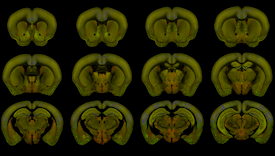
Kate Hong is an assistant professor in the Department of Biological Sciences and the Neuroscience Institute at Carnegie Mellon University. Prior to starting her lab in 2020, Hong was a biochemistry major at Brown University, and earned her Ph.D. in neuroscience from Harvard University in the laboratory of Joshua Sanes. She then trained as a postdoctoral fellow at Boston Children’s Hospital with Chinfei Chen and at Columbia University with Randy Bruno.
The Hong laboratory is interested in understanding the organization and function of neural circuits that underlie sensory-guided behaviors. Sensory information received from the environment is encoded by a series of neural circuits that must precisely coordinate their activity to generate an accurate perception of the world. Using the mouse whisker system as a model for touch perception, Hong’s research combines behavior, electrophysiology, genetics and computational methods to investigate how tactile information is processed in the brain.
The Hong lab aims to establish how multiple areas of the brain dynamically orchestrate neural activity during active sensation; furthermore, they seek to define the mechanisms by which subcortical areas are affected by and recover from cortical injury.
